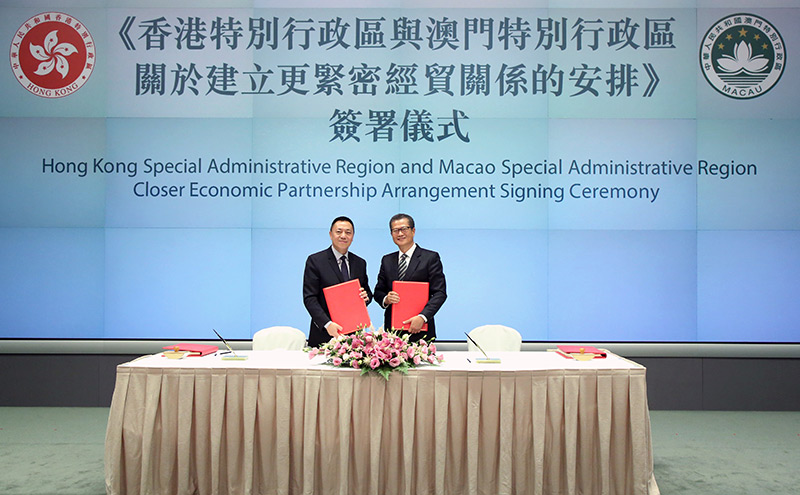Hong Kong Special Administrative Region and Macao
Special Administrative Region Closer Economic
Partnership Arrangement (HK-Macao CEPA)
OverviewOn trade in goods, Macao was Hong Kong's 17th largest trading partner in 2023. Bilateral trade in goods between the two economies amounted to about HK$89.1 billion in 2023. On trade in services, Macao ranked 24th among Hong Kong's trading partners in 2022. Bilateral trade in services amounted to about HK$4.9 billion in 2022. On investment, Macao was the 19th major source of inward direct investment (IDI) into Hong Kong (with a stock of HK$32.6 billion) and 12th major destination of outward direct investment (ODI) from Hong Kong (with a stock of HK$89.4 billion) at the end of 2022. |
 |
Background
Hong Kong and Macao commenced formal discussions for HK-Macao CEPA in November 2015. After three rounds of talks and subsequent discussions, the main text and the schedule of commitments were finally agreed on 29 June 2017 and HK-Macao CEPA was signed on 27 October 2017.
The HK-Macao CEPA is comprehensive in scope and the commitments therein go beyond those undertaken by Hong Kong and Macao under the World Trade Organisation (WTO) (i.e. WTO-plus), providing enhanced legal certainty to market access or treatment to one another. Hong Kong and Macao enjoy close and long-established bilateral trade relations. Both economies have highly liberalised trade regimes. The HK-Macao CEPA would contribute to enhanced economic cooperation and development of the two places, as our service providers will enjoy better market access and predictability when operating in Macao.
HK-Macao CEPA entered into force on 27 October 2017. The liberalisation measures of trade in goods and services provided for therein were implemented on 1 January 2018.
Full Text of HK-Macao CEPA
LegCo Briefs
Press Releases
Useful Links
Contact Us
Key Outcomes
HK-Macao CEPA consists of 12 Chapters, covering a wide range of areas of mutual interest to Hong Kong and Macao. Major features and liberalisation measures of the HK-Macao CEPA are summarised below.
- Both Hong Kong and Macao do not apply any tariff on imports.
- Hong Kong and Macao will bind the existing regimes providing legal certainty to our traders on tariff-free movement of goods between the two places.
- The two sides commit not to apply non-tariff measures inconsistent with the WTO rules to goods imported and originated from the other side.
- The two sides commit not to apply tariff rate quota to goods imported and originated from the other side.
- The existing non-preferential origin rules will be used to establish the origin of Hong Kong products.
- Hong Kong and Macao reaffirm their obligations under the relevant WTO agreements.
- Hong Kong and Macao have agreed not to take anti-dumping and countervailing measures against goods of each other.
- Hong Kong and Macao have agreed to strengthen communication and cooperation in customs clearance facilitation. The specific content of cooperation shall be formulated and implemented in accordance with Chapter 11 (Economic and Technical Cooperation)
- Apart from reiterating their observance of the rights and obligations under WTO, Hong Kong and Macao have agreed to intensify their joint efforts in communication and cooperation in the areas of technical regulations, standards and conformity assessment procedures. The specific content of cooperation shall be formulated and implemented in accordance with Chapter 11 (Economic and Technical Cooperation)
View full text of Chapters relating to Trade in Goods:
Chapter 3:
Trade in Goods
Chapter 4:
Trade Remedies
Chapter 5:
Customs Procedures and Trade Facilitation
Chapter 6:
Technical Barriers to Trade
Chapter 7:
Sanitary and Phytosanitary Measures
- The service providers of Hong Kong and Macao will enjoy legal certainty that their market access for majority of the committed sectors will not be subject to limitations such as number of services suppliers, service operations or employees in the sector; the value of transactions; the legal form of the service supplier; or the participation of foreign capital.
- Macao's WTO-plus commitments encompass sectors where Hong Kong has traditional strengths or has potential for development. These include audiovisual services, environmental services, telecommunications services, distribution services and education services.
- Apart from specific market access commitments, HK-Macao CEPA also includes other general obligations to facilitate trade in services. In particular, the rules and disciplines developed under HK-Macao CEPA will improve transparency of domestic regulations and ensure that they do not constitute unnecessary barriers to trade in services.
View full text of Chapters and Annexes relating to Trade in Services:
Chapter 8:
Trade in Services
(Annex 1: Schedule of Specific Commitments of Hong Kong)
(Annex 2: Schedule of Specific Commitments of Macao)
- Hong Kong and Macao have agreed in principle to discuss a separate instrument on investment. The discussions will cover elements of investment promotion and protection that are typically found in a modern investment agreement.
View full text of Chapter relating to Investment:
Chapter 9:
Investment
- Hong Kong and Macao have agreed to intensify their joint efforts to strengthen cooperation in the area of intellectual property. The specific content of cooperation shall be formulated and implemented in accordance with Chapter 11 (Economic and Technical Cooperation).
View full text of Chapter relating to Intellectual Property:
Chapter 10:
Intellectual Property
- Hong Kong and Macao have agreed to enhance cooperation in customs procedures and trade facilitation, technical barriers to trade, sanitary and phytosanitary measures, intellectual property, as well as transparency in laws and regulations.
View full text of Chapter relating to Economic and Technical Cooperation:
Chapter 11:
Economic and Technical Cooperation
Economic and Technical Cooperation Work Programme
- Hong Kong and Macao shall resolve any problems arising from the interpretation or implementation of the HK-Macao CEPA through consultation in the spirit of friendship and cooperation.
View full text of Chapter relating to Institutional Arrangements:
Chapter 12:
Other Provisions







